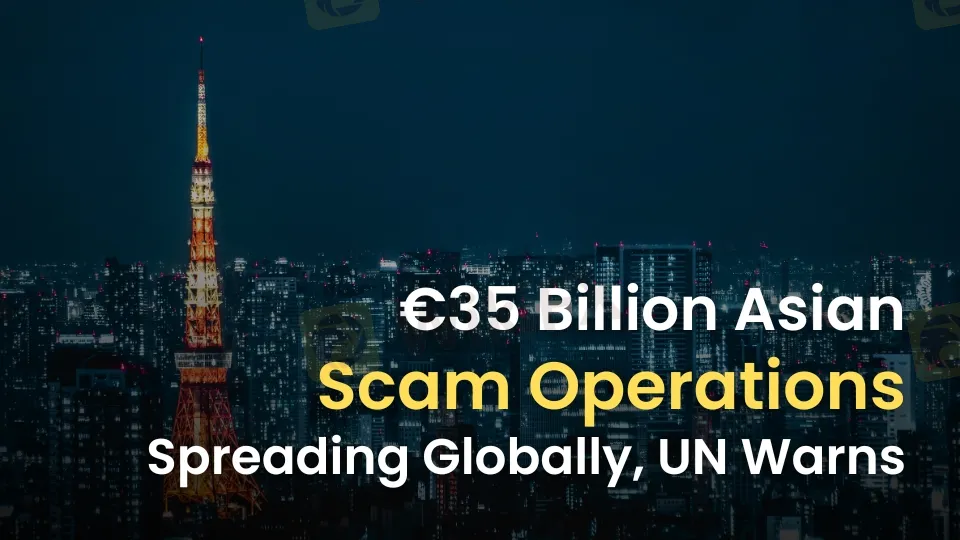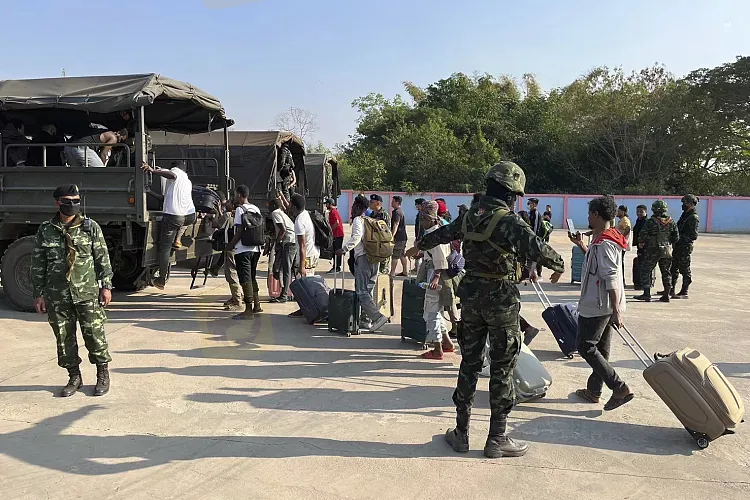Asian Scam Operations Worth €35 Billion Spreading Globally, UN Warns
Abstract:The UN report reveals the growing threat of transnational crime, driven by AI, money laundering, and scams across Asia, Africa, and Latin America.

Organized crime groups from East and Southeast Asia are stepping up their activities worldwide, finding ways to thrive despite stronger efforts by law enforcement, a new United Nations (UN) study points out. Fresh online platforms, smarter money laundering systems, and tools like artificial intelligence (AI) and deepfakes are pushing whats now called “crime as a service” to new heights.
Over the past several years, scam networks have taken root across Southeast Asia, particularly in border zones like Cambodia, Laos, Myanmar, and the Philippines. These clever criminals have built flexible scam hubs that move quickly, staying out of reach of local police. Theyve been tricking people everywhere with made-up love stories, shady investment promises, and secret gambling setups.

But the UN study shows these scams aren‘t just a regional issue anymore. They’re spreading to places like Africa, Latin America, and beyond. The growth has been striking, especially in areas where police presence is weak, turning those spots into perfect bases for these lawbreakers to grow. A big reason for this shift is the heat coming down on scam operations in Southeast Asia. As those areas crack down harder, the crime groups are branching out to places with looser rules. “This reflects both a natural expansion as the industry grows and seeks new ways and places to do business, but also a hedging against future risks should disruption continue and intensify in Southeast Asia,” noted Benedikt Hofmann, who serves as the acting regional lead for Southeast Asia and the Pacific at the UN Office on Drugs and Crime (UNODC).

The size of these operations is mind-blowing. UNODC figures suggest hundreds of large-scale scam hubs are pulling in almost $40 billion (€35 billion) every year. That kind of money shows how dangerous these networks are, now reaching into Africa, South Asia, the Middle East, and even some Pacific islands. They‘re not just running scams—they’re also washing cash, moving people illegally, and hiring help in places like Europe, North America, and South America.
Nigeria stands out as a key trouble spot, with police swooping in on crypto and romance scams linked to Southeast Asian crews. Nearby, Zambia and Angola have also dug up cyberfraud tied to Asian groups.
In Latin America, Brazil is facing a tough climb with more online fraud, gambling, and money laundering connected to Southeast Asian gangs. Late in 2023, Peru uncovered a grim case where over 40 Malaysians were forced into cybercrime by the Taiwan-based Red Dragon crew after being trafficked.

The UN report makes it clear that Southeast Asian outfits arent alone in this. Other criminal bands from around the world are joining in, making it trickier to tackle this wave of digital wrongdoing.
New online markets, a flood of stolen personal info, and better malware and AI tools are smoothing the way for these crooks to work across borders. These upgrades keep them hidden while they run tight, polished operations.
“The convergence between the acceleration and professionalization of these operations on the one hand and their geographical expansion into new parts of the region and beyond on the other translates into a new intensity in the industry — one that governments need to be prepared to respond to,” Hofmann emphasized, stressing the need for countries to work together fast.
As these crime rings keep adapting and stretching further, the pressure on law enforcement grows heavier. Governments everywhere have to move quickly and adjust to this shifting scene to take on the rising danger of worldwide criminal networks.

Read more

Risky Choice? What Traders Should Know About Bold Prime
Risk exists everywhere — even well-known brokers are not exceptions. But they often don’t talk about the risks. Instead, they highlight their strengths and try to attract customers while hiding the potential downsides. However, in this article, you’ll learn about the risks involved with Bold Prime.

From Novice to Pro: Why Investors Trust Land Prime?
If you're passionate about forex trading and ready to begin your journey as a trader, this article is worth exploring. It highlights the key features that Land Prime offers to both traders and investors.

Five Positive Signs That Make BCR Reliable Broker
Thinking of investing? Exploring Brokers and Have you come across BCR Forex Broker but feel confused? Is it a great choice or a bad decision? Hold on . Check out the article and know why this broker could be a trustworthy choice for you.

How Fake News Sites Are Fueling a Global Investment Scam Epidemic
A surge in sophisticated investment scams has been uncovered, exploiting fake news websites that mimic globally trusted media outlets such as CNN, the BBC, and CNBC. According to a July 2025 report by cybersecurity firm CTM360, more than 17,000 fraudulent websites have been detected, designed to mislead users and funnel them into elaborate financial traps.
WikiFX Broker
Latest News
What WikiFX Found When It Looked Into Emar Markets
MT4 vs MT5 Which Forex Trading Platform Fits Your Needs in 2025?
Short or Long Term: Which to Choose for Double-Digit Returns from Gold Investments?
Gold Soars Above $3,350 as XAU/USD Rallies on Trade Tensions
What is Forex Trading Simulator?
Switzerland tourism boosted as women's soccer continues record-breaking rise
Alchemy Markets: A Closer Look at Its Licenses
Wondering Why Your International Earnings Come Less Than Expected? It's Because of Forex Markup Fees
FCA to modernise rules to unlock investment
How Fake News Sites Are Fueling a Global Investment Scam Epidemic
Rate Calc
